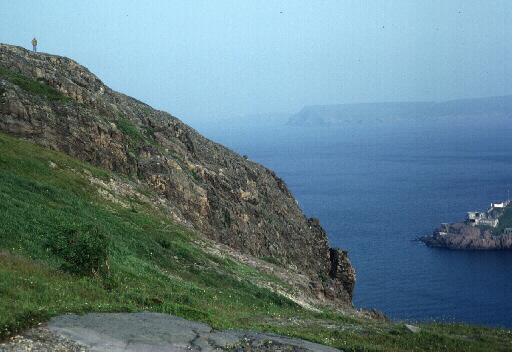 |
 |
| CAPE SPEAR | ST JOHNS HOTELS | TOURS | MARCONI | NEWFOUNDLAND HOTELS | FREE MAPS
St Johns Newfoundland
VISIT HISTORIC ST JOHNS
St. Johnís is one of the oldest European settlements in North America and is the capital city of Newfoundland and Labrador. Its name is derived from the feast day of St. John the Baptist, because it was on that day in 1497 that Giovanni Caboto, or John Cabot, sighted the New Founde Land. Originally called St Johns Bay, the perfectly sheltered harbour drew explorers and fishermen here in the 1500s. The city has had an eclectic history from summer fishing station to brawling colonial seaport, to a commercial and communications hub.
The blend of English and Irish New world and old, gives the city a style and vitality thatís as fresh as the breeze that always blows on Signal Hill., so named because the arrival of ships was announced from here to the town below through a series of flag signals. From the hill Canadaís second largest National Historic Park, there is a spectacular view of the city, its harbour and the adjacent coastline. You can visit the Queenís Battery, fortifications that date from the Napoleonic Wars, and watch the Signall Hill Tattoo re-enact colonial military exercises. The interpretation centre features an audio visual presentation of the history of Newfoundland, with special emphasis on military history. To the right of the interpretation centre is Gibbet Hill where many years ago the body of hanged criminals wrapped in chains, dangled as a chilling deterrant to potential law breakers. At the top of the hill is Cabot Tower, built in 1897 to commemorrate the 400th discovery of Newfoundland and the 60 year of Queen Victoriaís reign. On the grounds outside the tower are interpretive exhibits dealing with the harbours fortifications.
†
It was from a spot just below the tower that Guglielmo Marconi received the first transatlantic wireless message on December 12, 1901 ushering in the modern world of telecommunications.
†
In 1919 St.Johnís was the starting point for the race to fly the Atlantic because of its proximity to Europe. Several crews tried, but the honour of the first non-stop flight across the atlantic went to Captain John Alcock and Lieutenant Arthur Whitten-Brown. Cabot Tower was the last North American Landmark that Charles Lindenburg saw on his solo flight to Paris in 1927. He flew right out between the hills through the Narrows, a narrow inlet that connects the harbour to the ocean.
Another site of Historic interest in this area is the Quidi Vidi Battery which overlooks Quidi vidi village at the eastern edge of St. Johnís. Constructed by the by the French during their capture of St Johns in 1762, its first life was a short one. The British Won the last battle of the seven years war right here in St Johns just a short while later. The fort was rebuilt in 1780 and operated by British forces until their withdrawl from Newfoundland in 1870. That was the year Newfoundland decided not to join Canada, and the British Pullout left no doubt about what the Imperial Government thought of that decision. The fort was ironically restored in 1967 to mark the 100 th birthday of Canada. Newfoundlanders changed their minds and joined Canada in 1949. The forts reconstruction was based on the 1812 plans of its layout. It is open to the public during the summer months.
†
From here you can visit Quidi Vidi Lake the site of the annual Royal St. Johnís Regatta which has been held since at least 1826. And is still run on the first Wednesday of August. It is considered to be the oldest continuing sporting event in North America. Sailing, canoeing, kayaking, and sailboarding are other popular activities that take place on the lake.
Downtown St Johns is a great place to go exploring. Visitors should walk around because the traffic patterns are as eccentric as the geography. The current layout dates from 1892. That year most of the city was destroyed by fire for the third time in the 19th century.